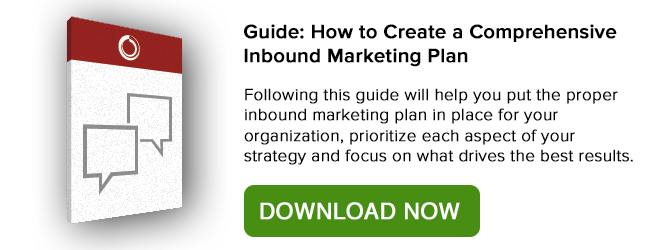Whether you’re looking for a way to get an inbound marketing strategy off the ground and running or you’re looking for new ways to improve your current marketing plan, partnering with an inbound marketing agency can offer many advantages.
But if there is one thing for certain, it’s that there is no shortage of digital marketing agencies. So how do you go about choosing the agency that best suits your needs?
Some agencies were born online while others have tried to adapt their traditional service offerings to meet the new demands of the web. Some agencies focus on large clients, while others focus on small and medium businesses. Some agencies truly focus on sales and revenue growth while many others hide behind vague brand engagement and awareness metrics.
In this post we will teach you how to properly evaluate an agency's strengths and weaknesses, help you understand why communication and collaboration are key factors in an effective agency-client working relationship, and finally we’ll outline what types of on-going planning, strategy and reporting you should expect from your agency.
These are the seven questions that every client should ask before hiring a marketing agency.
1) Who will be managing my account and executing the work?
When you are considering hiring a marketing agency one of the first questions you should ask is who will be managing your account and who will be executing the work. Some agencies have experienced in-house teams that manage client work, while other agencies simply outsource client work to contract and offshore workers. Other agencies use a combination of skilled internal account strategist and a network of engaged freelancers for specific tasks.
It is important that you feel confident in the experience and expertise of the people responsible for your success.
2) How do we stack up in terms of agency spend and production requirements compared to your other clients?
It is a bit of a case-by-case situation, but typically you do not want to be an agency's biggest or smallest client. If you are the biggest client you run the risk of being too big for the agency to handle. If you’re too small you might not get the same level of customer service and priority as a much larger, higher value client.
Smart businesses don’t let any one client become more than 10% of their revenue. Given that your inbound marketing agency will be your partner in success you need to have the utmost confidence that their business is stable and sustainable.
When selecting an agency make sure that they have the technical ability to execute the projects that you are anticipating, that they have the capacity to fulfill your production requirements and that they have processes in place to manage on-going client relationships, both for small and large projects.
3) What planning and strategy exercises will be required to get up to speed?
When you’re establishing a working relationship with an agency you’ll need to spend some time getting acquainted with each other.
As a client you need to understand the agency’s expectations, how work will be managed, the approval process and what to expect in terms of general onboarding timelines and deliverables. Experienced agencies will have a well-defined process in place to get both the client side and agency side teams up to speed in a timely manner.
Ask about how the agency handles client on-boarding and how they ensure that agency employees working on your account will have an appropriate level of knowledge about your business and competitive environment.
4) How do you manage client communication and collaboration?
It may seem like you are sweating the small stuff, but when you’re evaluating an agency you should inquire about how the agency manages client communication and collaboration.
As a client you want your budgeted agency hours going into real work, not project management and administration, although you should anticipate that at approximately 10% of your budget will be required for project management.
Agencies that have implemented proper platforms and processes to manage client communication, collaboration, project management, reporting and billing waste much less time managing client relationships and business operations and spend far more time actually getting work done.
The level of sophistication an agency demonstrates in these areas is often an indication of their level of experience dealing with clients of your size and requirements. Make sure that you understand and feel confident in the agency’s processes for setting timelines, executing work, gathering feedback, measuring results and on-going optimization.
5) What makes a great client so good to work with? And what makes an awful client so bad?
Just like anything else, there are good clients and there are bad clients. When evaluating an agency ask them what makes their best clients so good to work with, and what makes their worst clients so bad.
Interviewing a potential agency is very similar to interviewing a potential new hire – there needs to be a great cultural and organizational fit for the collaborative working relationship to be efficient and enjoyable.
6) Which key performance indicators does your team typically focus on for client work and how will you report on our progress month-over-month?
If you have ever worked with a digital agency there is a good chance that you have become accustomed, or maybe even frustrated by monthly marketing analytics reports. Often times there are so many numbers presented in these reports you simply cannot draw any reasonable conclusion.
It is important to understand how and why to measure things like website traffic, social media follows and paid ad impressions, but those metrics often don’t tell the whole story. Marketers need to present their results in numbers that stakeholders outside the marketing department can easily understand – leads, customers and revenue.
If an inbound marketing agency is truly sales oriented they will focus their client reporting more on the number leads generated, lead quality, the flow of leads through each stage of the sales funnel, the number of new customers and how effective various marketing tactics are in generating traffic, leads and customers.
7) What will the first 90 days of work entail?
One of the many advantages of working with an inbound marketing agency is the fact that you can really hit the ground running. Experienced inbound agencies have the existing knowledge to direct your inbound marketing efforts right from day one.
When you are evaluating inbound agencies ask them what the first 90 days of working together will look like. They should be able to tell you exactly what will be done to drive early results and when it should happen.
The list of potential to-dos presented should far exceed the work that can actually be executed in the initial 90-day phase. This is a good sign that the agency has the vision to forge a long term working relationship, not just take direction and deliver on your specific requests.
When it comes time to begin evaluating inbound marketing agencies basic criteria like industry experience, level of expertise, breadth of service offerings and pricing will help you establish an initial list of potential partners. Asking these 7 questions will help you narrow your search and ultimately select the agency that best suits your organizations needs.
We see it all the time, digital marketing agencies are all tactics, no strategy. If you have tactics without strategy, you have disorder. If you have strategy without tactics, you have thinkers but not doers. Tactics serve strategy.
This is overlooked far too often. There are a lot of moving pieces that contribute to the success of a well-rounded inbound marketing strategy and they all work in unison.

